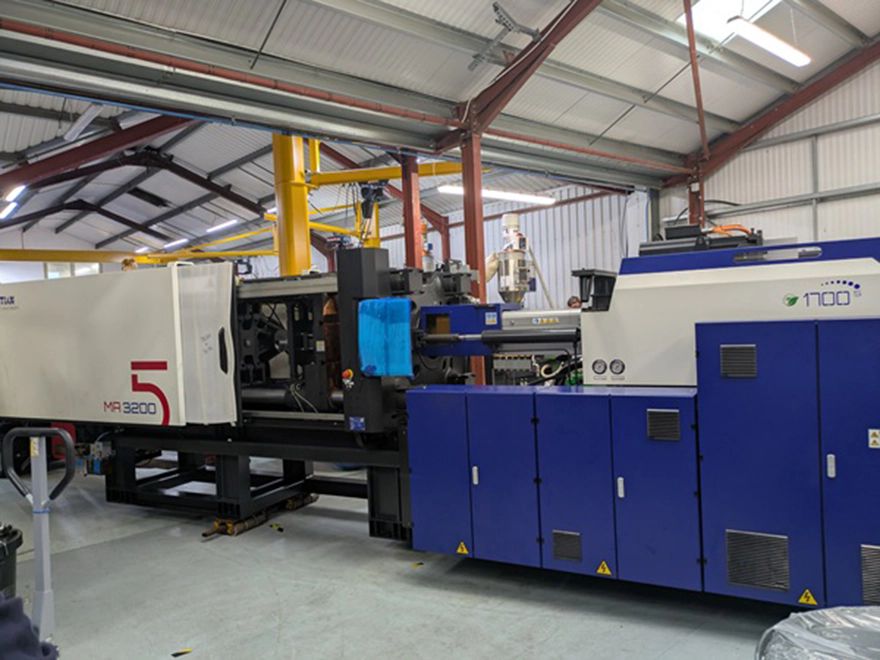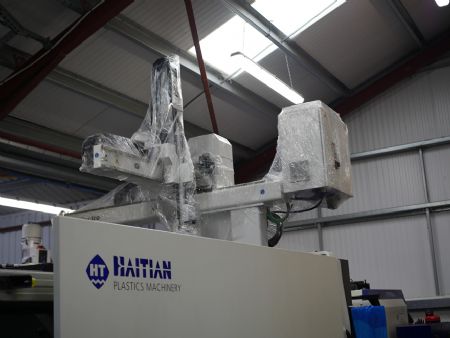 Broanmain Plastics’ new 320-tonne Haitian injection moulding machine
Broanmain Plastics’ new 320-tonne Haitian injection moulding machineDorking-based mass moulder
Broanmain Plastics, a manufacturer of volume plastic precision components, took delivery last month of a fully automated 320-tonne Haitian injection moulding machine featuring a Hilectro cartesian robot, supplied by
Haitian UK, Aylesbury. The new addition to the company’s line-up will create ‘a smarter, and more sustainable production capability for the future’.
For mass-produced plastic components in particular, Broanmain is focused on addressing the scale of the sustainability challenge by becoming more resource-efficient and reducing waste. This includes ensuring productivity from each unit of raw material and component manufactured at its facility is maximised.
Veronica Edmunds, head of the Haitian UK sales team, said: “The Generation 5 Mars is a servo-hydraulic machine equipped with an electric screw motor as standard. This has a massive impact on energy efficiency as the use of a traditional hydraulic screw drive is the most energy hungry phase of the injection moulding process. It is also incredibly quiet and delivers exceptional precision and reliability that mass manufacturers depend upon. Compared to fixed pump hydraulic machines, these energy-efficient servo-hydraulic moulding machines can save processors like Broanmain over 70% in energy consumption.”
Mould larger componentsOperations manager Thomas Catinat said: “We intentionally selected this particular 320-tonne machine to provide extra manufacturing capacity and to mould larger components for a number of new projects we have recently won. Having the automation option was essential for the handling of 1kg parts. As this was our first step into automation, we very much valued knowing that the whole package was being supplied by Haitian.”
Ms Edmunds continued: “The weight and aesthetics mean that each part must be carefully removed from the tool and placed on a conveyor to prevent structural and cosmetic damage. The Hilectro cartesian robot can perform this demoulding task at a consistent pace and rate. Having a choice of end of arm tooling means that the whole cell will be very adaptable to Broanmain’s future production needs, including ‘lights-out machining’.”
 Pictured right: Broanmain’s Generation 5 Mars machine features an electric screw motor as standard and includes a Hilectro cartesian robot
Pictured right: Broanmain’s Generation 5 Mars machine features an electric screw motor as standard and includes a Hilectro cartesian robotBroanmain managing director Jo Davis said: “We are constantly assessing the efficiency of production runs to ensure finite resources are not being wasted or causing unnecessary pollution.”
Mr Catinat added: “The energy savings are clearly impressive. Furthermore, this new machine can accommodate tools that fit into both 250-tonne and 500-tonne machines, which allows us to bridge the production gap in the most efficient way.”
Before and after energy tests running at the same cycle times will be performed on installation. Because the Generation 5 series includes all the additional hardware, automation and HT-X-tend software extras at no extra cost, Haitian claims that a mass manufacturer like Broanmain could reasonably expect a return of investment within one year.
Lowest energy consumptionMs Edmunds explained: “The intelligent control system featured on the Generation 5 series can optimise the entire moulding process, ensuring repeatability, efficiency and the lowest energy consumption. This in turn extends the entire lifespan of the machine and tooling, reducing wear and tear.” The Haitian Generation 5 series is certified to Euromap 9+.
Mr Catinat continued: “As well as creating cost advantages per unit, the transition to efficient, cleaner production is another way to spur economies of scale. For example, deployment of more energy efficient injection moulding machines can also lead to fewer product defects and consequently less material waste. This can induce additional cost reductions, which incentivises more deployment of cleaner technology and creating another cyclical innovation ecosystem.”
According to a Gartner report, lights-out manufacturing is expected to accelerate this year, with 60% of manufacturers expected to have at least two completely lights-out processes in 2025. With minimal human intervention required on the new production cell, Broanmain has started operating staggered early and late shifts, and the company expects that the deployment of automation will simply enhance efficiencies and improve the overall worker experience.
Mr Catinat concluded: “The focus for us is unlikely to be full lights-out production, but more lights-out processes. This then enables us to increase productivity and our manufacturing capacity so we can better adapt to customers’ needs. Having a cartesian robot that can take components from the mould, rather than having a full-time operative stationed at the machine that would slide open the door and stop production each time a component is taken from the tool, delivers a much faster cycle time, with no interruptions. It is also far safer for our workforce too.”